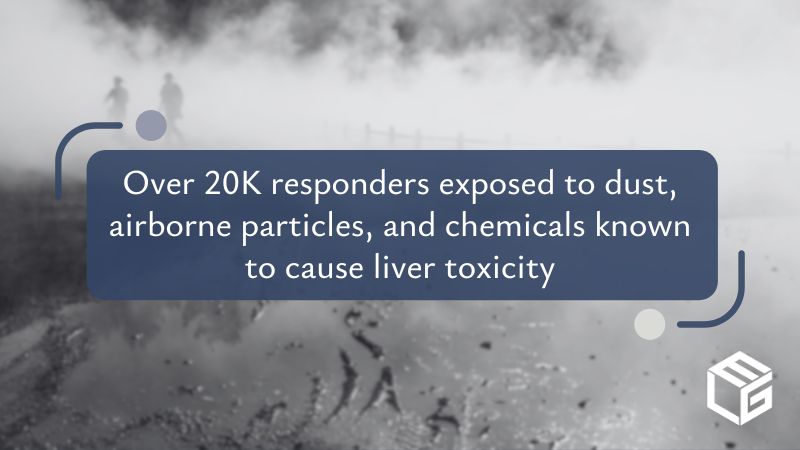-
About »
- Insulin MDL
-
Cases »
- Diseases
- Testimonials
- Government
- Contact
- Get Help Now
-

The tragic events of 9/11 left a lasting mark on countless lives. Recent research has shown that first responders who arrived at the World Trade Center site immediately after the attacks were more likely to develop liver cancer due to exposure to harmful toxins released into the air. If you were present at the WTC, the Shanksville site, the Pennsylvania crash site, the Pentagon crash site, or the New York City Exposure Zone during or after the 9/11 attacks and have been diagnosed with liver cancer, you may be eligible for compensation. We can help you with the claims process.
Claim ApplicationRecent findings suggest that first responders who were among the earliest to arrive at Ground Zero are at a higher risk of developing liver cancer compared to those who arrived later to help with rescue efforts. A study conducted by researchers at Mount Sinai analyzed lung scans of responders monitored by the WTC Health Program and found many had developed cancer.
The liver, responsible for detoxifying foreign substances, is often affected by chemical exposure. Following the 9/11 attacks, over 20,000 responders were exposed to dust, airborne particles, and chemicals known to cause liver toxicity. This increases their risk of toxin-associated fatty liver disease, including the most severe form, toxicant-associated steatohepatitis, which can lead to liver failure and cancer. The symptoms of liver cancer include:
If you were a first responder or were at the 9/11 attack sites during or after the attacks and have since developed liver cancer, you may be eligible for compensation. The amount of compensation is determined by adding up your non-economic losses (pain) and economic losses (lost wages) and then subtracting any compensation you've already received from other sources.
While the average payout for liver cancer can be around $250,000, the actual amount can vary depending on the severity of your cancer.
Our law firm has been fighting for the rights of victims of toxic exposure for over 30 years. If you or your loved one developed liver cancer after being exposed to toxins during or after the 9/11 attacks, we can help. To get started, we'll need proof of your presence in the Exposure Zone and your medical records. Our team will review your case and help you with the claims process.